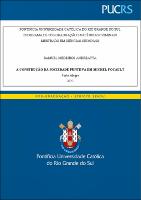| Share record |


|
Please use this identifier to cite or link to this item:
https://tede2.pucrs.br/tede2/handle/tede/10603Full metadata record
| DC Field | Value | Language |
|---|---|---|
| dc.creator | Andreatta, Samuel Medeiros | - |
| dc.creator.Lattes | http://lattes.cnpq.br/3023689561632480 | por |
| dc.contributor.advisor1 | Amaral, Augusto Jobim do | - |
| dc.contributor.advisor1Lattes | http://lattes.cnpq.br/4048832153516187 | por |
| dc.date.accessioned | 2023-01-30T13:45:53Z | - |
| dc.date.issued | 2022-12-19 | - |
| dc.identifier.uri | https://tede2.pucrs.br/tede2/handle/tede/10603 | - |
| dc.description.resumo | O problema central da pesquisa é a verificação de como Foucault estrutura a Sociedade Punitiva a partir de três obras, “Teorias e Instituições Penais”, “Sociedade Punitiva” e “ Vigiar e Punir”. Tentouse demarcar a emergência de práticas punitivas, sob a hipótese geral de que a Sociedade Punitiva é estruturada sob os conceitos de guerra civil e Ilegalismos. Os dois primeiros capítulos tratam da montagem do conceito de guerra civil, enquanto o terceiro busca demonstrar a perspectiva dos ilegalismos. A pesquisa, na área de concentração “Violência, Crime e Segurança Pública” buscou evidenciar as relações de poder que naturalizam e solidificam formas de controle social, apontando para emergência política de determinadas práticas de extração do saber. A Sociedade Punitiva é uma sociedade imersa na guerra. A emergência da guerra na obra Foucaultiana começa a ser montada a partir do desenvolvimento do Direito Germânico. Como modelo de inteligibilidade do espaço de práticas punitivas tentou-se trabalhar com o conceito de guerra civil, que a sua vez é estruturado a partir de duas dimensões. A primeira reinterpreta o pensamento político de Hobbes e seus efeitos e a segunda realiza uma (re) inversão da máxima de Clausewitz. Ao fim, procurou-se dar destaque aos pontos de resistência evidenciados pela obra foucaultiana. Em um primeiro momento, ao evidenciar o fenômeno histórico dos nu pieds como práticas de contrapoder, que tiveram uma importância política no deslocamento de alvos e forma de criminalização. Em segundo momento, demarcando a passagem da noção de sedição para a noção de ilegalismo, conceito que é categorizado para demonstrar uma perspectiva de sucesso dos objetivos da sedimentação de práticas punitivas a partir de um circuito gerenciável. | por |
| dc.description.abstract | The central problem of the research is the verification of how Foucault structures the Punitive Society from three of his works, “Theories and Penal Institutions”, “Punitive Society” and “Discipline and Punish”. An attempt was made to point out the emergence of punitive practices, under the general hypothesis that the Punitive Society is structured under the concepts of civil war and Illegalism. The first two chapters deal with the construction of the concept of civil war, while the third seeks to demonstrate the perspective of illegalism. The research, in the area of concentration "Violence, Crime and Public Security Policies" sought to highlight the power relations that naturalize and solidify forms of social control, pointing to the political emergence of certain practices of knowledge extraction. The Punitive Society is a society immersed in war. The emergence of war in Foucault's work begins to be assembled from the development of Germanic Law. As a model of intelligibility of the space of punitive practices, we tried to work with the concept of civil war, which in turn is structured from two dimensions. The first reinterprets Hobbes' political thought and its effects, and the second performs a (re) inversion of Clausewitz's maxim. In the end, we tried to highlight the points of resistance evidenced by Foucauldian work. At first, by highlighting the historical phenomenon of the nu pieds as counter-power practices, which had a political importance in the displacement of targets and forms of criminalization. Secondly, demarcating the passage from the notion of sedition to the notion of illegalism, a concept that is categorized to demonstrate a successful perspective of the objectives of sedimentation of punitive practices in terms of a manageable circuit. | eng |
| dc.description.provenance | Submitted by PPG Ciências Criminais ([email protected]) on 2023-01-26T12:21:56Z No. of bitstreams: 1 SAMUEL_MEDEIROS_ANDREATTA_DISS.pdf: 1913644 bytes, checksum: 4e251d404054ad6480b7a48d74f9566b (MD5) | eng |
| dc.description.provenance | Approved for entry into archive by Sheila Dias ([email protected]) on 2023-01-30T13:22:23Z (GMT) No. of bitstreams: 1 SAMUEL_MEDEIROS_ANDREATTA_DISS.pdf: 1913644 bytes, checksum: 4e251d404054ad6480b7a48d74f9566b (MD5) | eng |
| dc.description.provenance | Made available in DSpace on 2023-01-30T13:45:53Z (GMT). No. of bitstreams: 1 SAMUEL_MEDEIROS_ANDREATTA_DISS.pdf: 1913644 bytes, checksum: 4e251d404054ad6480b7a48d74f9566b (MD5) Previous issue date: 2022-12-19 | eng |
| dc.description.sponsorship | Coordenação de Aperfeiçoamento de Pessoal de Nível Superior - CAPES | por |
| dc.format | application/pdf | * |
| dc.thumbnail.url | https://tede2.pucrs.br/tede2/retrieve/186339/SAMUEL_MEDEIROS_ANDREATTA_DISS.pdf.jpg | * |
| dc.language | por | por |
| dc.publisher | Pontifícia Universidade Católica do Rio Grande do Sul | por |
| dc.publisher.department | Escola de Direito | por |
| dc.publisher.country | Brasil | por |
| dc.publisher.initials | PUCRS | por |
| dc.publisher.program | Programa de Pós-Graduação em Ciências Criminais | por |
| dc.rights | Acesso Aberto | por |
| dc.subject | Criminologia | por |
| dc.subject | Guerra Civil | por |
| dc.subject | Ilegalismos | por |
| dc.subject | Sociedade Punitiva | por |
| dc.subject | Michel Foucault | por |
| dc.subject.cnpq | CIENCIAS SOCIAIS APLICADAS::DIREITO | por |
| dc.title | A construção da sociedade punitiva em Michel Foucault | por |
| dc.type | Dissertação | por |
| dc.restricao.situacao | Trabalho não apresenta restrição para publicação | por |
| Appears in Collections: | Programa de Pós-Graduação em Ciências Criminais | |
Files in This Item:
| File | Description | Size | Format | |
|---|---|---|---|---|
| SAMUEL_MEDEIROS_ANDREATTA_DISS.pdf | SAMUEL_MEDEIROS_ANDREATTA_DIS | 1.87 MB | Adobe PDF |  Download/Open Preview |
Items in DSpace are protected by copyright, with all rights reserved, unless otherwise indicated.




